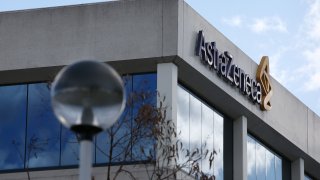
The third trial phase for AstraZeneca's COVID-19 vaccine candidate was well under way in other parts of the world, but just beginning to be administered at a site here in Southern California, when an "adverse reaction" of one participant in the United Kingdom led to the entire trial being paused.
At Harbor-UCLA Medical Center in Torrance, the Lundquist Institute began injections last week. Four enrolled participants had received them before AstraZeneca announced a decision to investigate the reaction before proceeding.
“AstraZeneca is having a review and evaluation of the trial this week and thus we are pausing enrollment for this to occur, upon completion of the evaluation we will be able to reschedule patients,” reads a statement issued Wednesday by the Lundquist Institute.
USC has also been approved to enroll a cohort of 500 participants -- two-thirds of whom will receive the vaccine, the remaining third a placebo -- and was just days from beginning when the pause order came down, according to USC Clinical Prof. Edward Jones-Lopez, MD, an infectious diseases specialist who is a co-investigator.
Collaborating with a team at Oxford University, AstraZeneca has been considered one of the three front-runners seeking to validate safety and effectiveness and earn approval for its vaccine candidate. AstraZeneca did not initially reveal the nature of the adverse reaction, but NBC News has confirmed the afflicted volunteer, a woman in Britain, developed symptoms consistent with transverse myelitis -- a severe inflammation of the spinal cord.
"That's a particularly concerning side effect, if it was in any way related to the vaccine," said Dr. Lopez-Jones.
Whether the woman's condition was related to receiving the vaccination is chief among the questions to be answered. With thousands of volunteers in the trial on four continents, there is a statistical likelihood some will develop ailments not necessarily related to the vaccine being tested.
Local
Get Los Angeles's latest local news on crime, entertainment, weather, schools, COVID, cost of living and more. Here's your go-to source for today's LA news.
In July, another participant developed neurological symptoms that were diagnosed as unrelated multiple sclerosis, according to the health news website STAT, citing statements made by AstraZeneca CEO Pascal Soriot during a private
conference call with investors.
"With an abundance of caution, at a time like this, you put a clinical hold, you investigate carefully to see if anybody else who received that vaccine, or any other vaccines, might have had a similar finding of a spinal cord problem," said Francis Collins, MD, director of the National Institutes of Health, in testimony Wednesday before a US Senate committee.
The pause in the trial came even as Soriot joined the CEOs of seven other COVID-19 vaccine developers in signing a pledge to "always make the safety and well-being of vaccinated individuals our top priority."
President Trump has repeatedly pushed for development of a vaccine faster than the usual timetable, and suggested a vaccine could be ready before election day.
"All these studies are surrounded by enormous pressure that you can say is somewhat political," said Dr. Jones-Lopez, at the same time hailing AstraZeneca's action as evidence of a commitment to not moving ahead faster than is safe.
NIH Director Collins and the US Surgeon General, Jerome Adams, MD, both insisted they would insure safeguards not be sidestepped for the sake of speed.
"There will be no shortcuts," testified Dr. Adams. "This vaccine will be safe and effective or it won't be moved along."
With the study being a double-blind, only its safety committee knows at this point how many of the four Southern Californians who received injections got the vaccine rather than the placebo. None has symptoms "even remotely related to what the UK participant is reported to be showing," according to a spokesman for the Lundquist Institute.
A Wisconsin couple who received their first trial injections last week said they've suffered no side effects.
"There are occasionally going to be problems with a particular vaccine formulation in some people and that's just the nature of the beast but it helps so many people on the other side," said Shelby O'Connor.
The AstraZeneca vaccine relies on an adenovirus that has been genetically modified to prevent it from replicating. The two other front-runners,
from Pfizer-BioNTech and Moderna, both use messenger RNA biotechnology. AstraZeneca's pause does not affect the continuation of their phase 3 trials.
Dr. Jones-Lopez believes widespread immunization with a safe and effective vaccine stands out as the best prospect for solving the COVID-19 pandemic.
"It's a fine line getting there in the best, quickest, and safest possible way," Dr. Jones-Lopez said.



